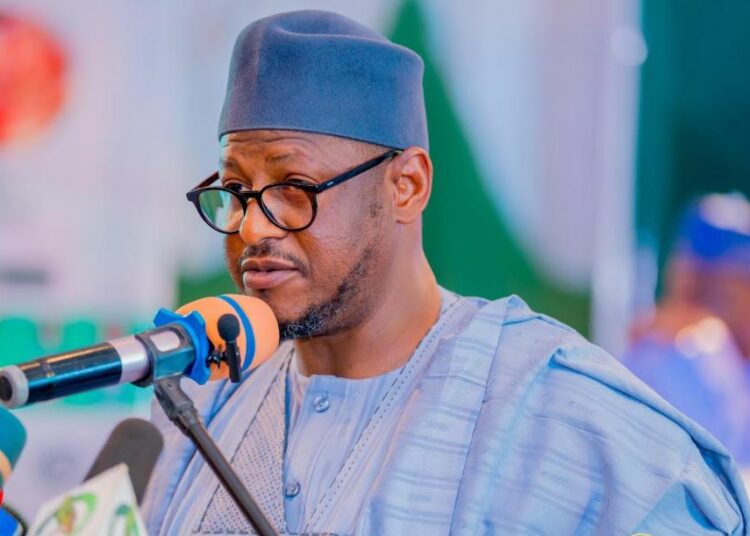Katsina State is fast emerging as a frontier in Nigeria’s clean energy transition as Governor Dikko Umaru Radda pushes two groundbreaking initiatives that could redefine the state’s power landscape: the formal takeover of the 10MW Lambar Rimi Wind Farm from the federal government and the approval of ₦19.89 billion for new solar power projects across 11 strategic public facilities.
At the centre of this ambitious energy revolution is the governor’s special adviser on power and energy, Dr Hafiz Ibrahim Ahmed. His detailed presentations at both federal and state levels have received commendations for their clarity, vision, and practicality.
Earlier, Dr Ahmed in Abuja, presented a strategic business case to top federal officials, including the Permanent Secretary of the Federal Ministry of Power, Mahmuda Mamman, and the Director-General of the Infrastructure Concession Regulatory Commission (ICRC), Jobson Ewalefoh.
The plan outlines how Katsina intends to complete and operationalise the long-stalled 10MW Lambar Rimi Wind Farm through a Special Purpose Vehicle (SPV), direct engagement with the Original Equipment Manufacturer, and a structured Power Purchase Agreement with the Kano Electricity Distribution Company.
The ICRC boss, impressed with Katsina’s preparedness, noted: “The detailed business case reflects a clear commitment to success.”
He expressed confidence that the project could move swiftly to completion once the SPV is established.
The permanent secretary was equally upbeat, praising Governor Radda’s political will and describing the move as “a milestone in subnational energy transition.”
However, while discussions were ongoing in Abuja, a parallel story unfolded in Katsina. At the 10th meeting of the State Executive Council, Governor Radda secured approval for what is arguably one of the most ambitious renewable energy programmes by any Nigerian state government: the deployment of 20.1MWp of solar PV capacity with 10.1MWh Battery Energy Storage Systems (BESS) across critical public institutions, alongside an additional 10MWp of solar at the Lambar Rimi site.
The approved project, valued at ₦19.89 billion, will directly power 11 vital state facilities, including water works and hospitals, schools, courts, and the State House of Assembly.
Beneficiaries include Ajiwa, Zobe, and Funtua Water Works; Umaru Musa Yar’adua University; General Amadi Rimi Orthopaedic Hospital; Hassan Usman Katsina Polytechnic; Katsina State House of Assembly; Turai Yar’adua Maternity Hospital; State High Court; Isah Kaita College of Education; and the Booster Station.
For many of these institutions, plagued for years by the national grid’s erratic supply, the shift promises uninterrupted, clean, and cost-efficient electricity.
The implications are far-reaching: more reliable water supply, improved healthcare delivery, stronger education systems, and more effective governance.
Speaking on the dual initiatives, Dr Ahmed described them as “a decisive step towards a brighter, more sustainable future for Katsina State.”
He emphasised that by embracing renewable energy on such a scale, the Radda administration was not just modernising infrastructure but also “setting the pace for environmental responsibility and economic resilience.”
Beyond the technical and financial specifics, the projects symbolise something larger: Governor Radda’s determination to position Katsina as a model for decentralised power generation in Nigeria.
Once operational, the combined wind and solar project at Lambar Rimi alone could become one of the country’s most significant subnational renewable energy hubs.
More than just an infrastructure upgrade, Radda’s energy agenda is pitched as a future-focused investment in energy security, economic competitiveness, and environmental stewardship. The projects are also expected to create jobs, stimulate local businesses, and inspire investor confidence in Katsina’s renewable energy sector.
As installations roll out in phases, priority facilities will begin to benefit early, signalling quick wins for citizens.
For Governor Radda, the projects mark a defining moment in his administration, an effort to move Katsina from dependence on fossil fuels to a diversified, clean energy future.
In the words of one senior government official: “This is not just about lights and megawatts. It’s about dignity, growth, and building a Katsina that works for its people today and for generations to come.”
… Approves Major Projects In Water, Education, Infrastructure
Similarly, the State Executive Council, in its 11th regular meeting, has also approved a fresh round of strategic projects across the water supply, education, and infrastructure sectors, underscoring Governor Dikko Umaru Radda’s commitment to delivering sustainable services under his “Building Your Future” development blueprint.
The meeting was chaired by Deputy Governor Faruq Lawal Jobe, with Governor Radda joining virtually to ensure seamless governance.
Briefing journalists shortly after the meeting, the information commissioner, Dr Bala Salisu Zango, announced that the council approved the procurement of water treatment chemicals for statewide distribution to ensure residents have access to clean and safe drinking water.
“This is a critical step towards improving public health and enhancing the quality of life of Katsina citizens,” Dr Zango said.
The council also sanctioned the completion of the long-abandoned Waqaf Library Complex originally initiated during the Shema administration at a cost of ₦362 million. Located beside the Federal College of Education, Katsina, the complex will accommodate the Department of Market Development, the SDGs Office, and the Department of Employment Promotion.
According to Zango, completing the project will “provide a modern and centralised workspace for key MDAs, improving efficiency in service delivery.”
Special Adviser on Primary and Secondary Education, Hon. Nura Saleh Katsayal, highlighted three major decisions. First, preliminary activities have been approved for the establishment of three model schools under the Special Institutions Programme for gifted and talented students.
Schools are expected to offer equal opportunities to children with exceptional abilities, regardless of background.
Second, the council endorsed the review and adoption of the National Policy on Non-State Schools to strengthen the state’s regulation of private and community schools. Katsayal explained that the policy would ensure such schools meet minimum operational standards while complementing government efforts in providing quality education.
Finally, the council awarded a ₦723.3 million contract for external works at the Special Model Secondary School in Radda, paving the way for its full operational takeoff.
Also, while addressing journalists, the commissioner for works and housing, Engr. Sani Magaji Ingawa described the series of approvals as “another demonstration of the administration’s resolve to invest in critical sectors that directly impact the lives of the people.”
Officials emphasised that all the decisions are designed to strengthen service delivery, expand educational opportunities, and modernise infrastructure in accordance with the Radda administration’s long-term vision.











